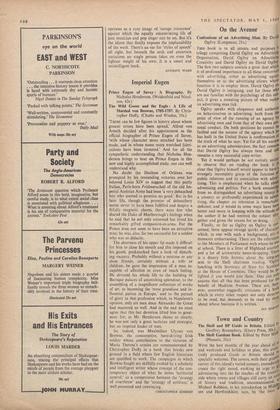Imperial Eugen
The Wild Goose and the Eagle : A Life of Marshal von Browne, 1705-1757. By Chris- topher Duffy. (Chatto and Windus, 35s.)
'THERE can be few figures in history about whom greater errors have been spread,' Alfred von Arneth decided after his appointment as the official biographer of Prince Eugen of Savoy, 'with whose character more mischief has been made, and in whose name more wretched fabri- cations have been invented.' And for all the sympathetic understanding that Nicholas Hen- derson brings to bear on Prince Eugen in this new and highly accomplished study, one can well understand why.
No doubt the Duchess of Orleans was prompted by his resounding victories over her beloved Louis XIV to suggest that this partly Italian, Paris-born Feldmarschall of the old Im- perial Austrian Army had been 'a very debauched boy who seemed to promise no good.' But in his later life, though the promise of debauchery seems never to have been fulfilled and despite a fitfully magnetic charm, there were few who shared the Duke of Marlborough's feelings when he said that he not only esteemed but loved his remarkably gifted companion-in-arms. For the Prince does not seem to have been an attractive man; he was, also, far too successful for a soldier who was so didactic.
The shortness of his upper lip made it difficult for him to close his mouth and this imposed on his gaunt, pockmarked face a look of disturb- ing vacancy. Probably without a mistress or any close friends, certainly without a wife or children, he gave the impression of a man in- capable of affection or even of much feeling. He devoted his whole life to the building bf Baroque palaces of astonishing splendour, to the assembling of a magnificent collection of works of art, to becoming the 'most grandiose and in- fluential patron in Europe,' and to the pursuit of glory in that profession which, in Napoleon's opinion, only six men since Alexander the Great had mastered so well. And in the end we must agree that this last devotion lifted him to great- ness; for, as Mr. Henderson shows so clearly, he was not only a great tactician and strategist, but an inspired leader of men.
So, indeed, was Maximilian Ulysses von Browne, the consumptive, hard-driving Irish soldier whose contribution to the victories of Maria Theresa's armies are commemorated by Christopher Duffy in a book that breaks new ground in a field where few English historians are qualified to work. The campaigns in which Browne fought are skilfully evoked by a scholarly and intelligent writer whose concept of the con- temporary object of what he terms 'territorial control,' as a compromise between the 'strategy of overthrow' and the 'strategy of attrition,' is well presented and convincing.
CHRISTOPHER HIBBERT














































 Previous page
Previous page